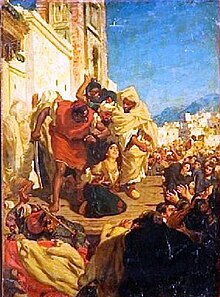| Part of a series on |
| Islamic jurisprudence (fiqh) |
|---|
| Islamic studies |
| Islam and other religions |
|---|
| Abrahamic religions |
| Other religions |
| Islam and... |

Capital punishment in Islam is traditionally regulated by the Islamic law (sharīʿa), which derived from the Quran, ḥadīth literature, and sunnah (accounts of the sayings and living habits attributed to the Islamic prophet Muhammad during his lifetime).[1][not specific enough to verify][2][not specific enough to verify] Crimes according to the sharīʿa law which could result in capital punishment include apostasy from Islam, murder, rape, adultery, homosexuality, etc.[3][4] Death penalty is in use in many Muslim-majority countries, where it is utilised as sharīʿa-prescribed punishment for crimes such as apostasy from Islam, adultery, witchcraft, murder, rape, and publishing pornography.[5]
- ^ Cite error: The named reference
elawawas invoked but never defined (see the help page). - ^ Samuel M. Zwemer, The law of Apostasy, The Muslim World. Volume 14, Issue 4, pp. 373–391
- ^ "Archived copy". Archived from the original on 2018-07-21. Retrieved 2022-07-11.
{{cite web}}: CS1 maint: archived copy as title (link) - ^ "BBC - Religions - Islam: Capital punishment". www.bbc.co.uk. Archived from the original on 2019-12-05. Retrieved 2019-12-04.
- ^ Asif, Naima (26 January 2021). "An introduction to sharia law and the death penalty". law.ox.ac.uk. Archived from the original on 25 October 2021. Retrieved 25 October 2021.
© MMXXIII Rich X Search. We shall prevail. All rights reserved. Rich X Search
